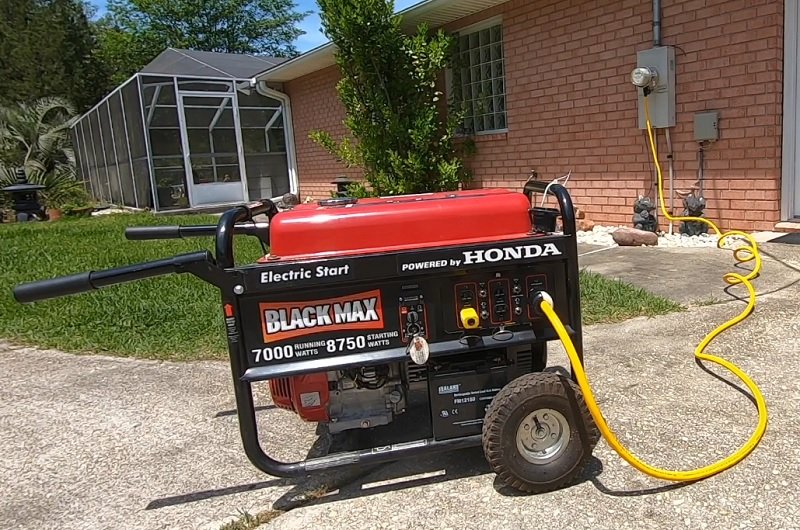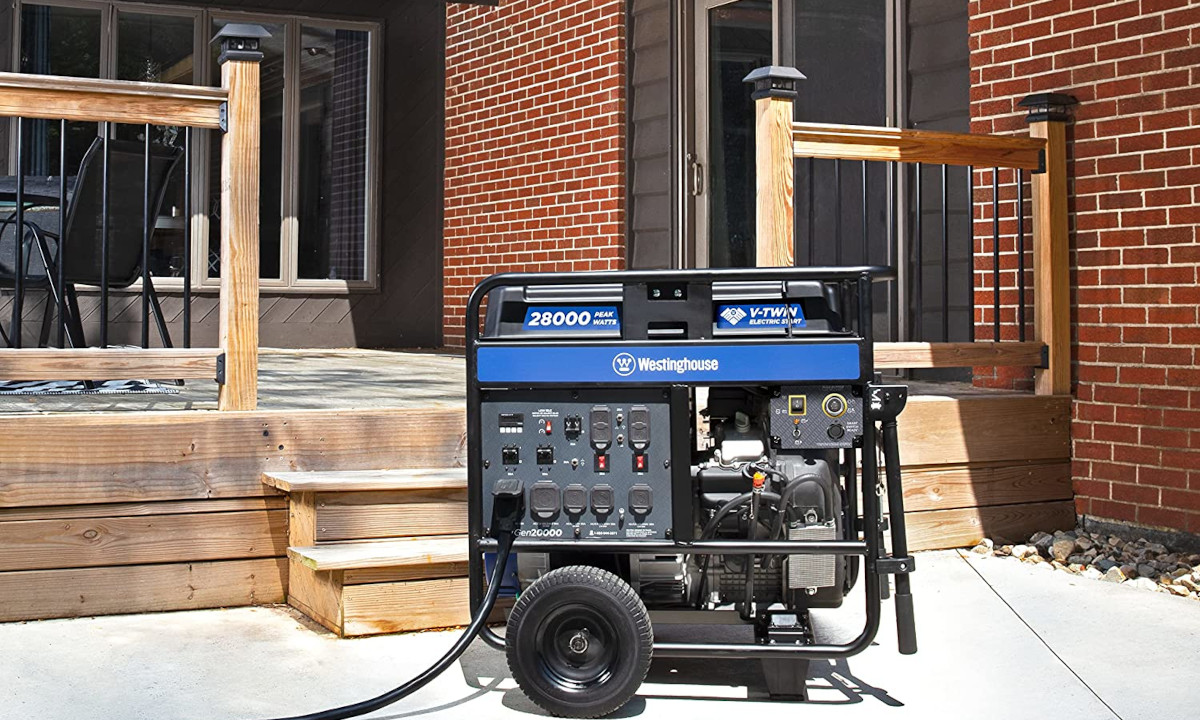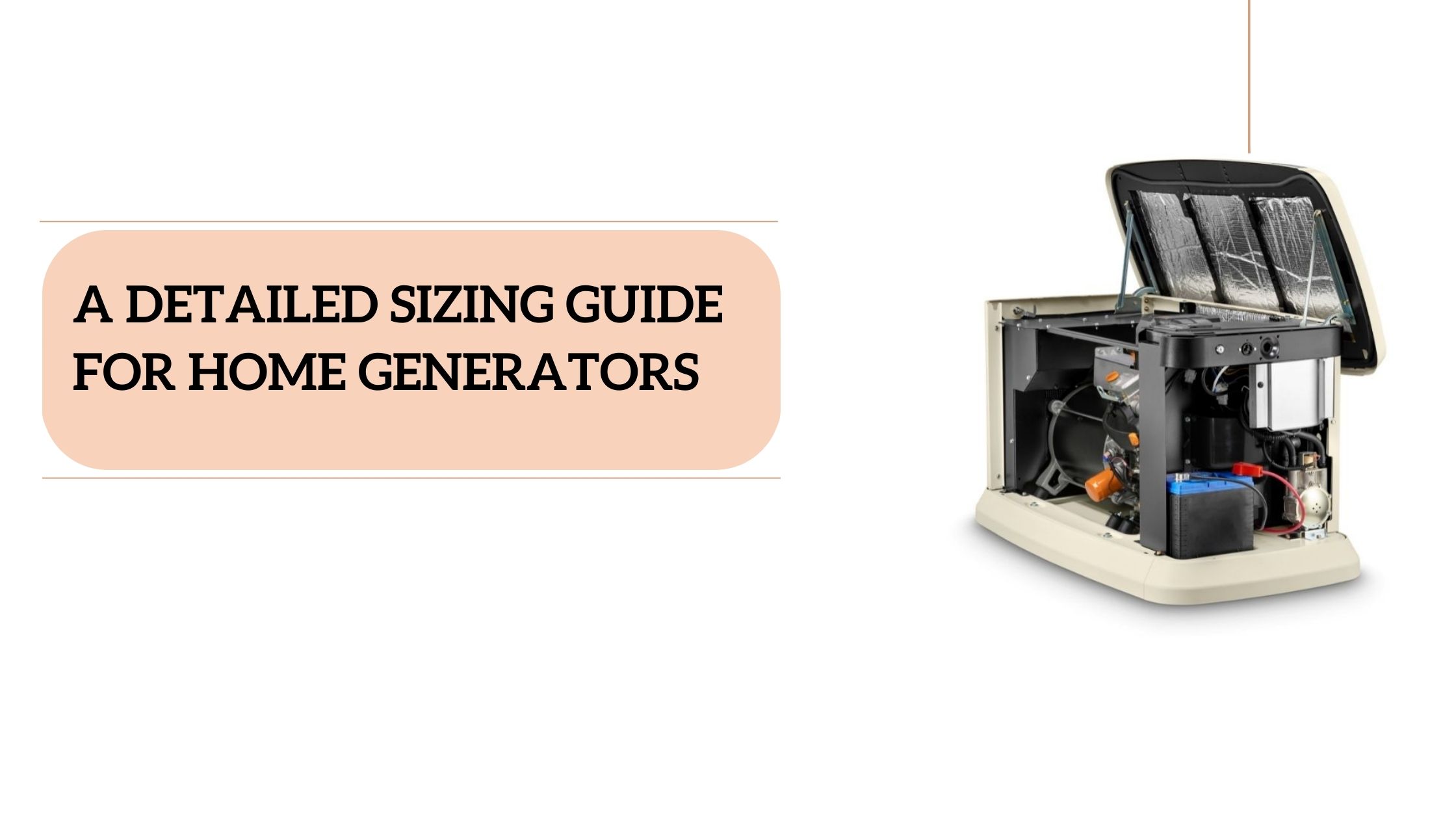Disclosure: This post contains affiliate links and I will be compensated if you make a purchase after clicking through my links. Learn More
For a hurricane, you need a generator that provides at least 5,000 to 7,500 watts. This size can power essential appliances and lights.
Choosing the right generator for a hurricane is crucial. A generator with 5,000 to 7,500 watts can keep your refrigerator, lights, and essential appliances running. This ensures you have the basics covered during a power outage. It’s important to assess your specific needs, such as medical equipment or additional devices.

Always calculate the total wattage required for all the appliances you plan to run. Investing in a reliable generator can offer peace of mind and security during severe weather conditions. Proper maintenance and regular testing of your generator will ensure it operates efficiently when you need it most.
Introduction To Generator Sizing
When a hurricane strikes, having a generator can be a lifesaver. Choosing the right size generator is crucial. The size impacts its effectiveness and your safety. This section will guide you on the essentials of generator sizing.
Importance Of The Right Size
A correctly sized generator ensures your essential appliances run smoothly. An undersized generator will struggle and may fail. An oversized generator wastes fuel and costs more money. Finding the right balance is key.
- Power Output: The generator must handle your power needs.
- Fuel Efficiency: A right-sized generator uses fuel wisely.
- Safety: Overloading a small generator can be dangerous.
Common Misconceptions
Many people think a bigger generator is always better. This is not true. A larger generator can waste fuel and money. Another misconception is that all appliances need power. Focus on essentials like refrigerators, lights, and medical equipment.
| Appliance | Average Wattage |
|---|---|
| Refrigerator | 700 watts |
| Lights | 60 watts each |
| Medical Equipment | Varies |
- Calculate your power needs.
- Select a generator that meets those needs.
- Consider fuel efficiency and safety features.
These steps help you choose the right generator size for a hurricane.
Assessing Power Needs
Understanding your power needs is crucial during a hurricane. The right generator can keep your home running smoothly. You need to know which appliances are essential and how much wattage they require.
Essential Vs. Non-essential Appliances
In a hurricane, some appliances are more important than others. Essential appliances keep you safe and comfortable. Non-essential appliances can wait until power is restored.
- Essential Appliances:
- Refrigerator
- Lights
- Medical equipment
- Phone chargers
- Non-Essential Appliances:
- Television
- Microwave
- Washing machine
- Air conditioner
Calculating Wattage
Calculating wattage helps you choose the right generator size. Each appliance uses a different amount of power. Here’s how to calculate the total wattage:
- List all essential appliances.
- Find the wattage for each appliance. This information is often on the appliance’s label.
- Add up the wattage for all essential appliances.
| Appliance | Wattage |
|---|---|
| Refrigerator | 700W |
| Lights | 200W |
| Medical Equipment | 400W |
| Phone Chargers | 50W |
In this example, the total wattage is 1350W. Choose a generator that can handle this load. Always add a buffer to your calculation. This ensures your generator won’t be overloaded.
Types Of Generators
Choosing the right generator for a hurricane is crucial. The generator size you need depends on the type you choose. There are two main types: Portable Generators and Standby Generators. Each has its own features and benefits. Let’s dive into these types to help you make an informed decision.
Portable Generators
Portable generators are versatile and easy to move. They are perfect for temporary use during a hurricane. These generators can power essential appliances like refrigerators, lights, and fans.
Here are some key features of portable generators:
- Mobility: Easy to move around.
- Affordability: Cheaper than standby generators.
- Fuel Options: Run on gasoline, propane, or diesel.
Portable generators come in various sizes, from small to large. To choose the right size, check the wattage of your essential appliances. A portable generator with 5,000 to 7,500 watts can power most household essentials.
Standby Generators

Standby generators are permanent fixtures. They automatically start during a power outage. These generators are ideal for those who need a reliable power source during a hurricane.
Here are some key features of standby generators:
- Automatic Operation: Starts automatically when power goes out.
- High Power Output: Can power entire homes.
- Fuel Supply: Connects to natural gas or propane.
Standby generators come in various sizes, too. For a small home, a generator with 7,000 to 9,000 watts is usually sufficient. Larger homes may need a generator with 20,000 watts or more.
| Type | Power Output | Fuel Type | Features |
|---|---|---|---|
| Portable Generator | 5,000 to 7,500 watts | Gasoline, Propane, Diesel | Mobility, Affordability |
| Standby Generator | 7,000 to 20,000+ watts | Natural Gas, Propane | Automatic Operation, High Power Output |
Both types of generators have their pros and cons. Assess your needs and budget to make the best choice for your hurricane preparedness.

Fuel Types And Efficiency
Choosing the right generator for a hurricane involves understanding fuel types and efficiency. Fuel choice impacts how long your generator runs and its cost. Let’s explore the most common fuel types: gasoline, propane, and diesel.
Gasoline
Gasoline is a popular fuel for generators. It’s easy to find and use. Gasoline generators are often affordable and portable. However, gasoline has a short shelf life. It requires proper storage to remain effective. This fuel type also produces more emissions than propane and diesel.
Efficiency: Gasoline generators are efficient but need regular refueling. They offer a good balance between cost and power output.
- Easy to find
- Affordable
- Short shelf life
- Higher emissions
Propane
Propane is another fuel choice for generators. It burns cleaner than gasoline. Propane has a longer shelf life, making it a good option for emergencies. Propane generators are usually quieter and require less maintenance. They are also safe to store.
Efficiency: Propane generators are efficient and have a longer run time. Propane is less energy-dense than gasoline, so you might need more fuel.
- Burns cleaner
- Long shelf life
- Quieter operation
- Safe storage
Diesel
Diesel generators are known for their durability and efficiency. They are ideal for long-term use and heavy loads. Diesel fuel has a longer shelf life than gasoline. Diesel generators need less maintenance and are more fuel-efficient. They are generally more expensive and heavier.
Efficiency: Diesel generators are highly efficient and provide a steady power supply. They are suitable for larger homes or businesses.
- Durable
- Long shelf life
- Fuel-efficient
- Higher cost
Sizing Based On Household Requirements
Choosing the right generator size is crucial during a hurricane. The generator must meet your household’s power needs. Below, we discuss the requirements for small and medium to large homes.
Small Homes
For small homes, a portable generator may suffice. Here’s a basic guide to help:
| Appliance | Running Watts | Starting Watts |
|---|---|---|
| Refrigerator | 700 | 2200 |
| Microwave | 1000 | 1000 |
| Lights | 400 | 400 |
| TV | 300 | 300 |
Add up the running watts and starting watts. Aim for a generator with a capacity of 3,500 to 5,000 watts.
Medium To Large Homes
For medium to large homes, more power is required. Consider these common household items:
- Central Air Conditioning: 3,500 running watts, 7,200 starting watts
- Electric Water Heater: 4,500 running watts, 4,500 starting watts
- Well Pump: 1,000 running watts, 2,000 starting watts
- Electric Range: 5,000 running watts, 5,000 starting watts
For these homes, calculate the total watts needed. A generator with 10,000 watts or more is ideal.
Always consider the most important keywords:
- Generator size
- Power needs
- Household requirements
- Hurricane preparedness
Using the right generator ensures your home stays powered during a hurricane.

Safety Considerations
Choosing the right generator for a hurricane is crucial. But it’s equally important to consider safety. Improper use of generators can pose serious risks. Let’s explore some key safety aspects.
Proper Installation
Always install your generator outside the house. Keep it in a dry area to prevent electric shocks. Ensure it’s on a stable, level surface.
Use a transfer switch to connect the generator to your home. This prevents back-feeding, which can harm utility workers. Hire a licensed electrician for installation. This ensures everything is up to code.
Avoiding Carbon Monoxide
Generators produce carbon monoxide (CO), a deadly gas. Always place the generator at least 20 feet from your home. Ensure exhaust fumes face away from windows and doors.
Install CO detectors in your home. These alarms alert you to dangerous levels of carbon monoxide. Never use a generator in an enclosed space, even with open windows.
Maintenance And Longevity
Ensuring your generator is ready for a hurricane involves more than just buying the right model. Proper maintenance and care are key to its longevity. This section will guide you through essential maintenance practices and storage tips.
Routine Checks
Regular routine checks help keep your generator in top shape. Follow these steps:
- Check the oil level before each use.
- Inspect air filters monthly for dirt.
- Test the battery every three months.
- Run the generator monthly for 15 minutes.
These checks ensure your generator is always ready for emergencies. A consistent maintenance schedule helps prevent unexpected failures.
Storage Tips
Proper storage extends your generator’s lifespan. Follow these storage tips:
- Store the generator in a dry, cool place.
- Drain the fuel tank before storage.
- Use a fuel stabilizer for long-term storage.
- Cover the generator to protect from dust and moisture.
Correct storage practices prevent rust and other damages. A well-maintained generator is reliable during hurricanes.
| Task | Frequency |
|---|---|
| Check oil | Before each use |
| Inspect air filter | Monthly |
| Test battery | Every 3 months |
| Run generator | Monthly |
By following these guidelines, your generator will serve you well. Regular maintenance and proper storage are crucial for reliability during hurricanes.
Expert Recommendations
Choosing the right generator size for a hurricane is crucial. Experts suggest considering your power needs first. This ensures you have enough power during an outage. Below, find expert recommendations on top brands and customer reviews.
Top Brands
Experts recommend several reliable brands for hurricane generators:
- Generac: Known for its durability and efficiency.
- Honda: Offers quiet and fuel-efficient models.
- Champion: Provides a good balance of power and affordability.
- Westinghouse: Features easy-to-use, powerful generators.
Customer Reviews
Customer reviews provide valuable insights. Here’s a summary of what users say:
| Brand | Average Rating | Key Feedback |
|---|---|---|
| Generac | 4.8/5 | Reliable, long-lasting, strong performance. |
| Honda | 4.7/5 | Quiet, efficient, easy to start. |
| Champion | 4.5/5 | Good value, powerful, user-friendly. |
| Westinghouse | 4.6/5 | Powerful, easy to use, reliable. |
Choosing a generator involves understanding your needs and checking reviews. This ensures you pick a reliable and effective model.
Frequently Asked Questions
How Do I Choose The Right Generator Size?
Estimate your power needs by listing essential appliances. Match their total wattage to the generator’s capacity.
Can A Small Generator Power My Whole House?
A small generator can power essential devices. For full home coverage, consider a larger, whole-house generator.
What Size Generator Is Best For Hurricanes?
A 5,000 to 7,500-watt generator typically suffices. It can power essentials like refrigerators, lights, and small appliances.
How Long Can A Generator Run During A Hurricane?
Run time depends on the fuel type and capacity. Most portable generators run for 8-12 hours per tank.
Conclusion
Choosing the right generator size for a hurricane is crucial. Consider your power needs and essential appliances. A properly sized generator ensures comfort and safety during outages. Always consult a professional for accurate guidance. Prepare now to avoid last-minute stress.
Stay safe and powered up during hurricane season.


